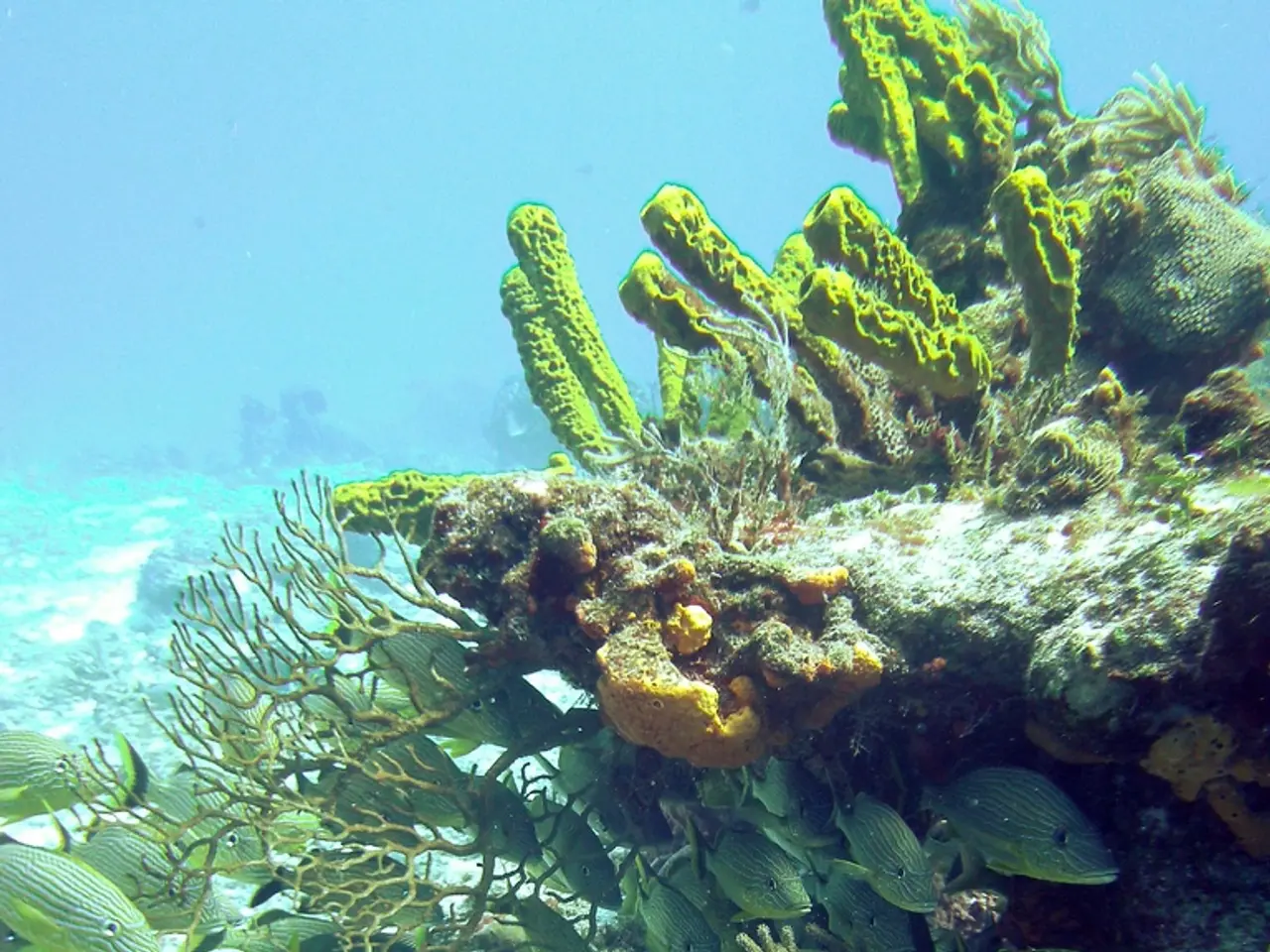Deepwater Horizon Oil Spill of 2010, Cleared by 2024?
In April 2010, the Deepwater Horizon oil spill released a staggering 134 million gallons of oil into the Gulf of Mexico, marking it as the largest offshore oil spill in U.S. history[1]. The catastrophic event caused severe, lasting damage to the Gulf ecosystem and local communities dependent on it.
Current Status and Long-term Ecological Impacts
The spill devastated coastal habitats such as saltwater marshes and mangroves, which are critical for biodiversity and act as "Blue Carbon" ecosystems that sequester carbon dioxide[1][4]. Oil contamination, along with ongoing threats like plastic pollution, continues to impair the health, reproduction, and survival of marine species and habitats[1][4].
The oil and associated toxic substances have reduced water quality and damaged marine organisms directly (e.g., causing injury, hypothermia, and toxicity in birds and mammals) and indirectly by degrading habitats, which slows ecosystem recovery[2][4]. Long-term ecological effects remain challenging to fully assess due to the complexity of ecosystems and factors like microplastics adding persistent stress[2][4]. Monitoring suggests some recovery but many species and habitats are still vulnerable.
Impacts on Local Populations and Seafood Contamination
The spill and subsequent closures of fisheries had immediate and lingering economic effects on communities reliant on fishing, tourism, and seafood industries[1][2]. Seafood safety concerns remain, as contaminants from oil can bioaccumulate in fish and shellfish, potentially causing health risks for consumers. Regulatory agencies implemented fishing closures and testing protocols to mitigate this risk, but concerns about contamination and long-term health effects persist among residents and consumers[1][2][5].
Ongoing and Future Risks
New proposed deepwater drilling projects in the Gulf (e.g., BP’s Kaskida project) pose significant risks of future spills, potentially worse than Deepwater Horizon, threatening to repeat or worsen impacts on ecosystems and communities[3][5]. Public awareness and regulatory scrutiny are generally low, raising concerns about preparedness and risk management for future oil spills[5].
Health Impacts
Mental Health Concerns: The spill exacerbated mental health issues, including anxiety and post-traumatic stress disorder (PTSD), particularly among those directly involved in the cleanup efforts or living in proximity to the spill[1].
Cardiovascular Issues: There were suggestive associations between oil spill exposure and an increased risk of nonfatal myocardial infarction (MI) among cleanup workers, with those who worked longer durations on the spill cleanup being particularly at risk[1].
Neurological Symptoms: Cleanup workers and residents reported an increase in neurological symptoms such as headaches, migraines, dizziness, and cognitive difficulties, linked to exposure to crude oil and chemical dispersants during the cleanup process[1]. Following the Deepwater Horizon oil spill, a significant number of oil spill cleanup workers developed chronic respiratory conditions, including chronic rhinosinusitis and reactive airway dysfunction syndrome[1].
Ongoing Efforts to Restore Ecosystems
While significant progress has been made in understanding and responding to oil spills since Deepwater Horizon, challenges remain in fully restoring affected ecosystems and preventing future disasters[1]. Ongoing efforts to restore ecosystems include innovative approaches such as playing back the sounds of shrimp and other fish from loudspeakers hidden in dead corals to attract fish and help to start to rebuild them[1].
Improved Spill Response Technologies
Technological advancements since 2010 have enhanced spill response capabilities, including improved skimmer designs and advanced mapping tools that help identify sensitive coastal areas at risk during spills[1]. Continued Research in Oil Spill Cleanup Methods: Recent studies have highlighted the need for improved strategies in managing oil spills, with ongoing research into effective cleanup methods[1].
Crustaceans and Mollusks are particularly susceptible to PAH accumulation and may retain contaminants longer than other seafood types[1]. Most seafood products are required to have a label indicating the country of origin[1].
In summary, while the Deepwater Horizon spill was capped over a decade ago, its ecological damage and socio-economic impacts continue today, with persistent contamination threats to seafood safety and Gulf communities' health. Scientific monitoring and regulatory efforts remain crucial, especially as new high-risk drilling projects threaten to introduce comparable environmental hazards[1][2][4][5].
- The evolution of spill response technologies is crucial to mitigate future disasters similar to Deepwater Horizon.
- Science thrives in understanding the long-term ecological impacts of oil spills on coastal habitats and marine species.
- Workplace wellness initiatives should include mental health support for individuals exposed to traumatic events like oil spills.
- Medical conditions, such as chronic respiratory diseases, can develop due to exposure to chemicals used in oil spill cleanups.
- Respiratory conditions, like chronic rhinosinusitis and reactive airway dysfunction syndrome, have been linked to oil spill exposures.
- Eye-health concerns can also arise from oil spill exposures, with increased reports of irritation and vision problems.
- Hearing issues may occur due to the loud noises associated with oil spill cleanups, putting workers at risk.
- Health and wellness programs should consider the potential long-term health effects of oil spill exposures.
- Fitness and exercise regimens can help individuals build resilience against the physical and mental stressors of oil spill cleanups.
- Sexual health, including reproductive issues, may be affected by chemical exposures during oil spill cleanups.
- Family health is interconnected with the wellbeing of local communities affected by oil spills.
- Climate change, and its impact on sea-level rise and storm surges, poses additional risks to coastal communities vulnerable to oil spills.
- The manufacturing industry should collaborate with regulatory agencies to develop sustainable alternatives to oil-dependent technologies.
- Mental-health care is essential for addressing the psychological trauma faced by individuals during and after oil spill cleanups.
- Men's health, including cardiovascular health, may be at risk due to oil spill exposures, as suggested by increased instances of nonfatal myocardial infarctions among clean-up workers.
- Skin-care products can help protect workers from chemical exposures during oil spill cleanups.
- Therapies and treatments, such as cognitive behavioral therapy, can help individuals manage PTSD and anxiety related to oil spill cleanups.
- Aging populations may be more susceptible to the health impacts of oil spill cleanups due to reduced immune system function.
- Women's health also encompasses potential reproductive issues arising from exposure to chemicals used during oil spill cleanups.
- Parenting skills can be strengthened through education on the health and safety risks associated with oil spill exposures.
- Psoriasis, a skin condition, can be exacerbated by chemical exposure during oil spill cleanups.
- The industry should prioritize safety measures and invest in technologies to minimize the risks and impacts of oil spills.
- Medicare policies should consider the long-term health impacts of oil spill cleanups when providing coverage for affected individuals.
- CBD-based products may offer potential therapeutic benefits for managing symptoms related to oil spill exposures.
- Neurological disorders, such as headaches, migraines, dizziness, and cognitive difficulties, can be linked to oil spill exposures.
- Environmental science research can help in identifying and addressing the ecological risks associated with oil spills.
- Finance and investment strategies should consider the potential economic impacts of oil spills on local communities and industries.
- Energy policies should aim to reduce dependence on fossil fuels to prevent future oil spills and minimize their environmental and health impacts.
- Real-estate markets can be affected by oil spill disasters, with property values potentially decreasing in affected areas.








